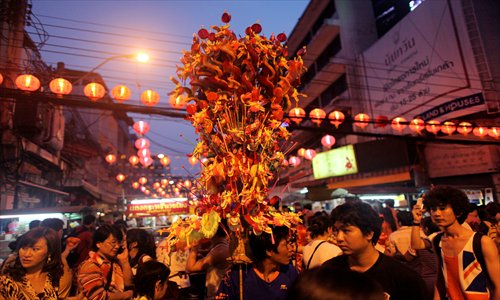HOME >> WORLD
Rooted in history
By Han Shuo in Bangkok Source:Global Times Published: 2013-9-27 0:03:02

Thais celebrate the Year of the Snake in Bangkok's Chinatown area during Chinese New Year on February 9. Photo CFP
After 300 years of development, Bangkok's Chinatown, also known as Yawolat, boasts being the most prosperous Chinatown in Southeast Asia. However, many have said that it began to lose its luster and nostalgic appeal in recent years after more and more young Thai-Chinese started moving their businesses to other areas.
Despite this trend, visitors to Bangkok's Chinatown will regularly be met with the sight of people lining up in front of some Chinese restaurants and shops.
Of these, the T&K Seafood restaurant is one of the most popular.
"Most of the restaurants and shops are run by Chinese and our business is pretty good as people from Thailand, China and other countries all enjoy the special elements and environment here," said Zheng Huiying, a 40-year-old second generation Chinese in Thailand who owns a bird nest shop in Bangkok's Chinatown.
There are as many Chinese as foreigners who frequent Bangkok's Chinatown, but for Chinese in Thailand, Chinatown is more than an ideal place for shopping and eating.
Deeply rooted
The history of Bangkok's Chinatown is the very epitome of the Chinese people's hardworking ethic in Thailand over the last 300 years. Chinese in the country have a special feeling for the place, not only because they see it as their business and cultural center, but more importantly, because of their roots there.
Vichit Prakobgosol, born to a third generation of Thai-Chinese in 1959, is now the general manager of a company specializing in event management and tour services. He told the Global Times that for the older generation of Chinese in Thailand, Bangkok's Chinatown represents their memories of their hometowns.
"All typical Chinese cultural elements, such as Chaozhou Opera and Taiwanese Opera, can be found in Chinatown. And in the past, the only place where you were able to buy special Chinese products was also Bangkok's Chinatown," Prakobgosol said.
Luo Yan, a Chinese student in Thailand, told the Global Times that Chinatown is the place that allows her to feel the presence and intimacy of Chinese culture.
"Many shops in Chinatown are run by Chinese. When you go there for shopping and talk to them using your native dialect, it really makes you feel like you're at home. Also you can find 'real Chinese food' with special flavors that you once enjoyed at home," Luo said.
Amnuay Thiamkeerakul, director of the East Asia Market Division under the Tourism Authority of Thailand, is a second generation Chinese in Thailand and grew up in Bangkok's Chinatown.
"Although I have moved out of the Chinatown many years ago, many of my friends still live there. I regularly go back there to meet them and seek out our childhood and home memories together," he said.
Strong future
Bangkok's Chinatown has become a special spot as it holds on to special Chinese traditions and characteristics.
However, Chinatown is not a destination tour groups generally tend to choose, because of a lack of good planning and layout.
For example, traffic in Chinatown is so bad that tourists wanting to visit it have to either take the subway or the river ferry.
Thiamkeerakul said that developing Bangkok's Chinatown inevitably meets with some constraints.
"Buildings in the Chinatown are already in a saturation condition and it will be hard for the area to expand. And the old planning made the streets very narrow and the traffic very bad," he said.
"As a result, in recent years the business environment in Bangkok's Chinatown has lagged behind Siam, Silom and other business areas," he added.
Prakobgosol believes that with China-Thailand trade ties getting increasingly closer, "Chinatown is no longer the only place where you can buy special Chinese products."
Chinese in Thailand have integrated well into society, and many of them, especially the younger generations, are moving their businesses to other areas in the capital.
"I have been staying here for decades and am used to it, but my sons say there are also opportunities elsewhere and they have their own choices," Zheng said.
Prakobgosol said the older generation of Chinese tend to stick to tradition and do not usually accept the "big move" of integrating and combining land and businesses.
"They already have pretty good revenues with their current business models, so it is natural that they do not want to change the status quo," he noted.
Prakobgosol believes that the lack of "hardware renovation" has caused Bangkok's Chinatown to lose some business opportunities, but its unique historical and geographical advantages and conditions provide a foundation for its role as a business and traveling hub.
"So I think in the next 10 to 20 years, Bangkok's Chinatown is still expected to be as prosperous as it is now, but it is hard to predict its development in the future," he said.
Posted in: Asia in Focus